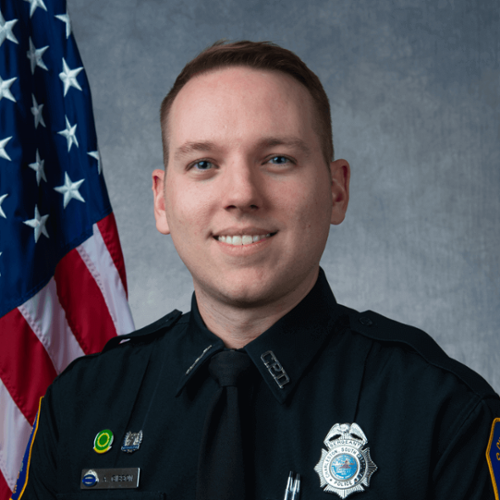PSO Director

Jeremy Wilson
Professor
Email: jwilson@msu.edu
Biography
Dr. Jeremy M. Wilson is a Professor of the School of Criminal Justice and Founding Director of the Police Staffing Observatory at Michigan State University (MSU), where he also founded and directed the Center for Anti-Counterfeiting and Product Protection and the Program on Police Consolidation and Shared Services. Prior to joining MSU, Dr. Wilson was a Behavioral Scientist at the RAND Corporation, where he led the development of the Center on Quality Policing and the Police Recruitment and Retention Clearinghouse. He has held a wide variety of appointments and honorary titles at prestigious institutions around the world, and has served as an instructor for numerous law enforcement, brand protection, and supply chain training programs.
As a scholar, educator, advisor, and consultant, Dr. Wilson has collaborated with police agencies, communities, task forces, multinational corporations, professional associations, governments, and other public and private entities throughout the U.S. and the world on many complex public safety problems, and he has led over $15M of projects sponsored by the U.S. Congress, various units of the U.S. Departments of Justice and Interior, community and institutional foundations, local governments, police departments, professional associations, and companies. He has written over 180 publications for practitioners and scholars on police staffing and personnel planning, organizational consolidation, resource allocation, performance assessment and ROI, community policing, brand protection, product counterfeiting, field interventions for violence prevention, data and measurement, empirical modeling and evaluation. He serves on the National Policing Institute Board of Directors, International Association of Chiefs of Police Research Advisory Committee, and Journal of Economic Criminology Editorial Board. He is a member of the International Association of Chiefs of Police, Police Executive Research Forum, American Society of Evidence-Based Policing, Michigan Association of Chiefs of Police, International AntiCounterfeiting Coalition, American Society of Criminology and Academy of Criminal Justice Science.
For his contributions to police research and practice, he was named a Distinguished Scholar by the American Society of Criminology Division on Policing, and the Police Section of the Academy of Criminal Justice Sciences honored him with the O.W. Wilson Award. He won the Outstanding Book Award from the American Society of Criminology Division on White Collar and Corporate Crime for his book, Brand Protection and the Global Risk of Product Counterfeits: A Total Business Solution Approach. Additionally, the MSU Innovation Center recognized him with the Corporate Connector Award for his extensive partnership building with industry. He has received additional leadership, research, service, and supervisory awards by the American Society of Criminology, RAND Corporation, The Ohio State University, Indiana University, Michigan State University, Johnson & Johnson, Underwriters Laboratories, and the City of Lansing. For more information, see https://jeremywilson.org/.
PSO Collaborators
Ian Adams
Email: ian.adams@sc.edu
Biography
Ian T. Adams, Ph.D. is an Assistant Professor of Criminology and Criminal Justice at the University of South Carolina. His applied research program focuses on policing practices, with a specific interest in the personnel of policing, their tactics, and measuring policy outcomes linked to policy change. His policing research has been published in the top general field journals of both criminal justice and public administration, including Justice Quarterly, Criminology and Public Policy, and Public Administration Review. He appears regularly in media outlets to speak about policing policy, practice, and problems, including recent coverage at The Washington Post and a Frontline documentary on police lethal use-of-force. Dr. Adams leverages his nearly twenty years of experience as a police practitioner to seek out opportunities for bridging academic and practitioner concerns, with the goal of improving the institution of policing for both those who work inside it and the communities that rely upon its services. Find his current CV here.
![]()
Michael Aiello
Email: michael.aiello@fredonia.edu
Biography
Michael F. Aiello is an Associate Professor in the Department of Sociocultural and Justice Sciences at the State University of New York at Fredonia. He received his PhD in Criminal Justice from the Graduate Center, City University of New York, housed at John Jay College of Criminal Justice. He conducts research on a variety of topics, including police standalone websites, bystander intervention, and police social media. In the field of police recruitment, his recent research centers on experiments concerning how different physical fitness standards, levels of procedural justice emphasis, and inclusive language impact the composition of recruit pools.
![]()
 Erik Alda
Erik Alda
Email: ealda@marymount.edu
Biography
Dr. Erik Alda is an Assistant Professor in the Criminal Justice Department at Marymount University, in Virginia. He received his PhD in Criminology and Public Policy from American University in 2017. His research interests lay at the intersection of performance measurement (Efficiency) of criminal justice institutions and comparative criminology, with a focus on developing countries. An important strand of his research examines the efficiency of criminal justice institutions and, in particular, of police organizations. In particular, he examines how police organizations can improve their performance by efficiently reallocating their resources to maximize their service delivery. He has conducted comparative research on this topic in various countries in Latin America and the Caribbean, Eastern Europe, and Sub-Saharan Africa. Erik is also working with governments to design and evaluate the performance of their criminal justice sector to inform policy and program design that can lead to more efficient use of public resources. Another strand of his research studies focuses on evaluating public policies in developing countries by analyzing large administrative datasets. In addition to his research interests, Erik has ongoing collaborative research projects in Spain, Mexico, Chile, El Salvador, Honduras, and the US. Learn more about Erik’s research on his website.
![]()
 Vivian Aranda-Hughes
Vivian Aranda-Hughes
Email: hughe481@msu.edu
Biography
Dr. Vivian Aranda-Hughes is an Assistant Professor in the School of Criminal Justice at Michigan State University. Her research focuses on correctional experiences, with a particular focus on the well-being, perceptions, and professional challenges faced by correctional staff. She examines organizational culture, occupational stress, and the ways institutional environments shape the lives of both staff and incarcerated individuals. Her scholarship contributes to a deeper understanding of how staffing, resources, and correctional practices impact outcomes in prisons and jails. By exploring the lived experiences of correctional employees, Dr. Aranda-Hughes’s work informs evidence-based approaches to staff retention and organizational reform. She is also interested in how correctional institutions intersect with broader systems of inequality and justice. Her work has been published in a variety of peer-reviewed scientific journals and media outlets.
![]()
 Sarah Charman
Sarah Charman
Email: sarah.charman@port.ac.uk
Biography
Dr. Sarah Charman is a Professor of Criminology at the University of Portsmouth, UK and Editor-in-Chief of the International Journal of Law, Crime and Justice. She has researched and published widely in the last 25 years on the sociology of policing and the policing organization, most notably on policing cultures, police leadership, police recruits and pandemic policing. Her current research focuses on the areas of police wellbeing and police leavers.
![]()
 Steve Chermak
Steve Chermak
Email: chermak@msu.edu
Biography
Dr. Steven Chermak (Ph.D., State University of New York at Albany) is a Professor in the School of Criminal Justice at Michigan State University and a lead investigator affiliated with The National Consortium for the Study of Terrorism and Responses to Terror (START). Dr. Chermak’s research has focused on policing, terrorism, and school violence.
First, his research on policing has involved working with police organizations to implement and then evaluate staffing and the effectiveness of various crime control strategies. Some of his work has explored community policing in various communities, including understanding how to measure community policing, understanding the role of the media and media coverage, and identifying organizational obstacles to implementing community policing. He has also helped police organizations understand public perceptions of their department, and identify staffing and organizational issues, and discuss ways to manage these challenges. Some of the law enforcement agencies he has collaborated to study staffing issues include the Michigan State Police, the Louisville Police Department, Indianapolis Police Department, Grand Rapids Police Department, Baltimore Police Department, Cedar Rapids Police Department, Highland Park Public Safety, and the Saugatuck Police Department. Second, he has received funding from the National Institute of Justice, to study the criminal and terrorist activities of domestic extremists. Working with a colleague at the John Jay College of Criminal Justice (Professor Joshua Freilich), this funding has supported the creation of the United States Extremist Crime Database—a national open-source database that includes data on the violent and financial crimes committed by extremists in the United States. He studies issues related to radicalization, investigation of terrorists and terrorist organizations, and responding to terrorism. Finally, he is currently funded by the National Institute of Justice to build a database that includes all fatal and non-fatal school shootings in the United States. This database will allow for a better understanding of the individuals and circumstances under which individuals attack schools.
Dr. Chermak’s research has been funded by the Department of Homeland Security, National Institute of Justice, and the Michigan State Police. He has published two books, six edited books, and numerous research reports. His research has appeared in a number of journals including Journal of Quantitative Criminology, Criminology and Public Policy, Justice Quarterly, Policing: An International Journal of Police Strategies and Management, Journal of Criminal Justice, Criminal Justice Policy Review, and the Journal of Crime, Conflict, and the Media.
![]()
 Terry Cherry
Terry Cherry
Email: cherryt@charleston-sc.gov
Biography
Sergenat Terry Cherry served as the recruiter for the City of Charleston Police Department in Charleston, South Carolina. In 2020, she was selected as a NIJ LEADS scholar and was the recipient of IACP’s 40 under 40. In 2021, she received the NAWLEE Ina Mae “Tiny” Miller Award for innovation and was selected to serve on the working group of the National Policing Institute’s Council for Police Reforms and Race. She is currently a National Policing Institute fellow, a New Blue fellow and was recently chosen for the Center for Homeland Defense and Security’s Emergence program. Her articles have been published in IACP Police Chief Magazine, online for Police1, and in various academic journals. Sergeant Cherry holds a BA from UCLA, an MBA in global business from Pepperdine University, and is currently pursuing her DPA from Valdosta State University.
![]()
Samantha Clinkinbeard
Email: sclinkinbeard@unomaha.edu
Biography
Samantha S. Clinkinbeard is a Professor in the School of Criminology and Criminal Justice, Reynolds Professor of Public Affairs and Community Service, and Assistant Dean in the College of Public Affairs and Community Service at the University of Nebraska at Omaha. Currently, her research is focused on women in policing, including the presence of masculinity and issues surrounding recruitment and retention. She has published a series of manuscripts and book chapters surrounding motivations and barriers to policing aspirations and workforce entry. Additional work on recruitment and retention is forthcoming, resulting from approximately 50 in-depth interviews she conducted with women in law enforcement. Further, she collaborates with local agencies on evaluating officer wellness programming funded by the COPS office Law Enforcement Mental Health and Wellness Act (LEMHWA). She has worked closely with the Nebraska Association of Women Police for several years and is currently collaborating on a best practices dissemination project with the International Association of Women Police (IAWP) and United Nations Women.
![]()
 Gary Cordner
Gary Cordner
Email: gcordner@gmail.com
Biography
Dr. Gary Cordner is academic director in the Police Academy/Education and Training Section of the Baltimore Police Department. Most recently he served as chief research advisor for the National Institute of Justice (NIJ) LEADS Scholars Program. He was a CALEA (Commission on Accreditation for Law Enforcement Agencies) Commissioner for nine years and has been associated with the Center for Problem-Oriented Policing since its inception. He is Professor Emeritus at Eastern Kentucky University, where he served as Dean of the College of Justice & Safety. Earlier in his career, he was a police officer and police chief in Maryland and obtained his Ph.D. from Michigan State University. Cordner was founding editor of Police Quarterly and is a past editor of the American Journal of Police; author of Police Administration (10th edition); and co-author of Police & Society (8th edition). He authored several monographs for the COPS Office and NIJ, was co-PI of the National Police Research Platform and is a past president of the Academy of Criminal Justice Sciences (ACJS).
![]()
Nick Corsaro
Email: corsarns@ucmail.uc.edu
Biography
Nicholas Corsaro is Associate Professor in the School of Criminal Justice at the University of Cincinnati and Director of the Center for Police Research and Policy. His research focuses on the role of the police in crime prevention, police organizations, and use of force studies, with a particular emphasis on the use of strategies, tactics, and organizational policies. He has served as a principal investigator for a number of projects totaling over $10 million in external research support across various urban police agencies and has worked to develop rigorous evidence regarding the most viable, effective, and efficient practices that police have used to address serious crime problems.
![]()
Nathan Cronin
Email: croninna@msu.edu
Biography
Nathan Cronin is a Michigan State University doctoral student in the School of Criminal Justice, currently assigned as a graduate research assistant to Dr. Jeff Rojek. His research interests include police retention and morale, policing on tribal reservations, rural policing, police K9 units, and fostering researcher-practitioner partnerships. Nathan holds a master’s degree from Sam Houston State University in Criminal Justice and Criminology. During his tenure at Sam Houston State University, he served as the first graduate research assistant in the newly established Center for Intelligence and Crime Analysis (CICA) under the direction of Dr. Bill Wells.
![]()
Jacqueline Drew
Email: j.drew@griffith.edu.au
Biography
Dr Jacqueline Drew is an Associate Professor with the School of Criminology and Criminal Justice and Griffith Criminology Institute and the Deputy Director of the Academy of Excellence in Financial Crime Investigation and Compliance, Griffith University, Australia. Jacki is a psychologist, holding a PhD in organisational psychology. Jacki has over 20 years of experience in law enforcement, as a practitioner and researcher. Jacki began her career in law enforcement with the Queensland Police Service (QPS), Australia. She undertook various roles, working in Equity and Diversity, Recruitment and the Leadership Centre. Jacki became a tenured academic at Griffith University in 2007. Jacki’s work focuses on police organisational practice and the organisational experiences of police personnel. She provides expert advice to law enforcement on organizational systems and personnel practices in the areas of police mental health, suicide, police leadership, career paths of women police, recruitment, selection and retention of police and best practice in police promotion systems. She works across Australia with State police organisations and other key stakeholder groups, including the Australian Institute of Police Management (AIPM). Jacki works internationally with law enforcement in the United States (US). She is a lead investigator on a national (US) biennial survey research program focused on police mental health. This research is being undertaken in collaboration with the US Fraternal Order of Police (FOP), the largest organisation of its type in the world. Jacki has recently been awarded an Australian Research Council (ARC) (Linkage) Grant, working with Queensland Police Commissioner Katarina Carroll, to develop a workplace health and wellbeing early warning system to improve the mental health and wellbeing of police officers. She also holds an ARC (Discovery) Grant focused on gender equity initiatives across Australia and New Zealand.
![]()
Neil Filosa
Email: filosane@msu.edu
Biography
Neil Filosa is a Ph.D. student in economics at Michigan State University who researches the police labor market. He is interested in the causes and consequences of changes in police recruitment and retention. His current research uses administrative data to investigate declining police retention and analyze which officers and police agencies are most affected.
![]()
Chase Flowers
Email: flowe149@msu.edu
Biography
Chase Flowers is a Michigan State University doctoral student in criminal justice. He is also employed as a research assistant at Michigan State University. He earned his bachelor’s degree in criminal justice, master’s degree in criminal justice, and master’s degree in public administration from the University of Central Florida. During his time at the University of Central Florida, he was employed as a graduate teaching assistant where he assisted in the planning, instruction, and grading of students’ work in six undergraduate courses, both in-person and online.
![]()
 Kevin Ford
Kevin Ford
Email: fordjk@msu.edu
Biography
Kevin Ford is a professor Psychology at Michigan State University. His major research interests involve improving learning and retention in the workplace through training and other learning activities. He is known for his work on understanding key criterion work constructs such as learning and performance and in particular the study of factors that impact the transfer of learning from training to the job. Kevin also concentrates on understanding factors impacting organizational change and identifying how to build continuous learning and improvement orientations within organizations. He has published over 100 articles and chapters. He has contributed six books including his recent textbook (2021) called “Learning in Organizations”. He has been part of several funded research projects from the National Institute of Health, The National Institute for Justice, The State of Michigan, the Naval Training Systems Center and the Air Force Resources Directorate. He is an active consultant with private industry and the public sector on training, leadership, and organizational change issues. Kevin’s contribution to the field of psychology has been recognized as he is a Fellow of the Society of Industrial and Organizational Psychology. He received his BS in psychology from the University of Maryland and his MA and Ph.D. in psychology from The Ohio State University.
![]()
 Tiana Gaudette
Tiana Gaudette
Email: tiana@msu.edu
Biography
Tiana Gaudette is a Ph.D. student in the School of Criminal Justice at Michigan State University and a Research Associate at the International CyberCrime Research Centre at Simon Fraser University. She assists Dr. Steven Chermak and Dr. Jeremy Wilson on funded research projects related to school violence, brand protection, and police staffing. Her work has been published in Crime & Delinquency, New Media & Society, Terrorism and Political Violence, as well as in several edited book collections. Tiana received her Bachelor's and Master's degrees in Criminology from Simon Fraser University.
![]()
 T.J. Geary
T.J. Geary
Email: geary@sc.edu
Biography
Major T.J. Geary is a 24-year law enforcement veteran and currently serves as the Operations Bureau Commander at the University of South Carolina Division of Law Enforcement and Safety. He previously commanded the Administration and Emergency Management Bureau. He is currently serving a two-year term as President of the South Carolina Chapter of the FBI National Academy Associates. He is a past President of the South Carolina Law Enforcement Officers’ Association (SCLEOA), a 7,000 member organization representing over 100 member agencies across the state. While President of SCLEOA, he played a significant role in crafting and successfully lobbying for the passage of landmark legislation that raised training, performance, and accountability standards for law enforcement in South Carolina. Major Geary also works part-time as a subject-matter expert and senior instructor for the U.S. Bureau of Justice Assistance (BJA) VALOR program. He has a strong interest in evidence-based policing and was a member of the inaugural cohort of the American Society for Evidence-Based Policing Applied Criminology and Data Management Course. He is a co-principal investigator on a multi-year research project on law enforcement mental health, resilience, and early career attrition that is funded by the National Institute of Justice. Major Geary is a graduate of the 251st Session of the Federal Bureau of Investigation National Academy in Quantico, Virginia and the 58th Session of the Senior Management Institute for Police in Boston, Massachusetts. He holds a master’s degree in Criminal Justice from USC and a graduate certificate in Criminal Justice Education from the University of Virginia. He is a member of the inaugural cohort of the Excellence in Policing and Public Safety Program at the Joseph F. Rice School of Law and is pursuing a Doctor of Philosophy (PhD) in Criminology at the University of South Carolina.
![]()
 Jennifer Gibbs
Jennifer Gibbs
Email: jengibbs@psu.edu
Biography
Jennifer C. Gibbs is an associate professor of criminal justice at Penn State Harrisburg. After finishing a Bachelor’s degree in Psychology from Keuka College, she completed a Master’s degree in Criminal Justice Administration from Niagara University while working as a civilian at the Niagara Falls, NY Police Department. Dr. Gibbs earned her Ph.D. in Criminology and Criminal Justice from the University of Maryland, College Park. Dr. Gibbs’ research interests include recruitment and retention in policing, police wellness, and terrorism. Recently, she was PI on a grant studying small and rural police, funded through the Center for Rural Pennsylvania. Notably, her work with Dr. Jonathan Lee on "Race and attitudes toward police: the mediating effect of social distance" was selected as a Highly Commended Paper in the 2016 Emerald Literati Network Awards for Excellence. In collaboration with the Penn State Justice and Safety Institute, Dr. Gibbs worked with Nigerian police officers as a co-PI on an IACP-US Department of State grant-funded law enforcement training. She also assisted the Pennsylvania Child Support Enforcement Training Institute with their program evaluations from 2019-2024. Dr. Gibbs is a member of the American Society of Criminology and the Academy of Criminal Justice Sciences, and she is the recipient of the American Society of Criminology Division of Policing 2024 Teaching and Mentorship Award.
![]()
 Anthony Gibson
Anthony Gibson
Email: gibsona@charleston-sc.gov
Biography
Lieutenant Anthony Gibson started at the Charleston Police Department as an intern in 2013 and served as the Recruitment, Selection & Retention Supervisor. In this role, he managed the department's recruitment initiatives, the unit's related research efforts, the implementation of various talent acquisition strategies, and renewed the agency’s commitment to officer retention through critical research and analysis. Additionally, he oversaw the department's commitment to the 30x30 Initiative, numerous mentorship and internship programs, as well as, the selection and hiring processes. Lieutenant Gibson believes in blending the strengths of research and data with the dynamic nature of law enforcement to create precise solutions to modern day policing challenges. His research interests include resource allocation, officer motivations, selection criteria, and officer retention strategies.
Currently, Lieutenant Gibson is managing a research-practitioner partnership to explore predictive models capable of identifying and assisting officers at-risk of prematurely leaving law enforcement through the American Society of Evidence-Based Policing’s inaugural Applied Criminology and Data Management cohort. Sgt. Gibson has a B.S. in Psychology and a Master's of Public Administration.
![]()
 Dayanara Gonzalez
Dayanara Gonzalez
Email: gonz1272@msu.edu
Biography
Dayanara Gonzalez is a master’s student in the School of Criminal Justice at Michigan State University. She received her bachelor’s degree in Criminal Justice with a minor in Philosophy from The State University of New York at Oswego in 2024. Her interests include offender reentry, policing, crime reduction, and discrepancies within the criminal justice system. Dayanara is working with Dr. Jeremy Wilson as a graduate assistant.
![]()
 Clifford Grammich
Clifford Grammich
Email: grammich@birdhill.us
Biography
Clifford A. Grammich, Ph.D., is director of Birdhill Research and Communications, LLC. Dr. Grammich has more than 25 years of social science research and communications experience. Much of his experience has been as a communications analyst with the RAND Corporation, where his projects included police staffing and public safety, among other issues. At RAND, Dr. Grammich assisted Dr. Wilson with a COPS project on police recruitment and retention in the contemporary environment, co-authoring both a volume of conference proceedings and a monograph summarizing lessons on recruiting and retaining effective police workforces.
As an independent contractor, Dr. Grammich has assisted several other policing projects of Dr. Wilson’s, including compiling resources on police consolidation and shared services, conducting field research for an NIJ multisite evaluation of police contracting and consolidation and shared services, and co-authoring more than a dozen publications on police organization and staffing. Dr. Grammich has also co-authored peer-reviewed work on emerging crimes, communities, demographics, public opinion, and social policy. He is a past president of the Association of Statisticians of American Religious Bodies, for which he has overseen decennial county-level enumerations of hundreds of religious bodies.
![]()
 Jeff Gruenewald
Jeff Gruenewald
Email: jgruenew@uark.edu
Biography
Dr. Jeff Gruenewald (Ph.D., Criminal Justice, Michigan State University, 2009) serves as Director of the Terrorism Research Center (TRC) and Professor in the Department of Sociology & Criminology at University of Arkansas. He is a PI for the American Terrorism Study (ATS), co- U.S. Extremist Crime Database (ECDB), and Bias Homicide Database (BHDB). Dr. Gruenewald’s research has been funded by the National Institute of Justice and Department of Homeland Security through the START Center. He has extensive experience in leading terrorism and homeland security projects that span multiple years and involve collaborative research teams of faculty, staff, and students from across different universities and government agencies.
Dr. Gruenewald has published over 50 peer-reviewed articles, mostly on topics related to terrorism, other forms of extremist violence, and the policing of terrorism. He has presented his research findings at national and international conferences, and has produced numerous research briefs, media reports, and other transitional products to promote wider consumption of his work. Dr. Gruenewald continues to teach graduate and undergraduate courses on topics of terrorism and homeland security, hate crime, and other criminal justice matters.
![]()
 Russell Hassan
Russell Hassan
Email: hassan.125@osu.edu
Biography
Russell S. Hassan is a professor and the Milton A. and Roslyn Z. Wolf Chair in Public Affairs at Ohio State University’s John Glenn College of Public Affairs. He earned his Ph.D. in 2010 from the State University of New York in Albany. He has done extensive research on how leadership and management practices shape work motivation, commitment, and performance of public sector employees, particularly those who work in law enforcement organizations. He is currently examining diversity management practices in law enforcement organizations and how such practices shape the recruitment and retention of diverse law enforcement officers. His research has appeared in leading public administration journals including the Journal of Public Administration Research and Theory, Public Administration Review, Public Management Review, and Review of Public Personnel Administration. Dr. Hassan is currently a co-editor of the International Public Management Journal. He was the Division Chair of the Public and Nonprofit Division of the Academy of Management and the Communications Secretary of the International Research Society for Public Management. Dr. Hassan is affiliated with the Local Government Research Initiative at the University of North Carolina at Chapel Hill and the Center for Organization Research and Design at Arizona State University. He is a Visiting Professor in the School of Business and Social Sciences at Aarhus University in Denmark.
![]()
Narelle Hickmon
Email: hickmonn@msu.edu
Biography
Narelle Hickmon is a doctoral student and research assistant in the School of Criminal Justice at Michigan State University (MSU). Prior to attending MSU, Narelle received her Bachelor of Science in Psychology from Aquinas College and her Master of Science in Criminal Justice from Grand Valley State University (GVSU). While attending GVSU, Narelle served as a research assistant, working alongside faculty and Michigan State Police in cold case investigation. During this time, she also worked as a Marine Deputy for a local sheriff’s department. Her research interests are focused on police allocation, workload management, investigations, women in policing, and law enforcement responses to human trafficking.
![]()
Shawn Hill
Email: shawnhill@umail.ucsb.edu
Biography
Shawn Hill is a police commander and a Ph.D. student at the University of California Santa Barbara in the department of communication. He is an NIJ LEADS Scholar, National Policing Institute Executive Fellow, a member of the Community Policing Committee of the International Association of Chiefs of Police and served as a member on the Bureau of Justice Assistance Executive Session of Police Leadership. Shawn’s research interests include examining relationships between the police and the public, police legitimacy, and police culture through an intergroup communication and accommodation lens. He has published peer-reviewed journal articles, book chapters, and co-edited the interdisciplinary volume, The Rowman and Littlefield Handbook on Policing, Communication and Society. He was guest editor of the special issue of Group Processes and Intergroup Relations titled, “The Police and Those Policed.” He is currently involved in the implementation and evaluation of intergroup interventions between the police and the public, and researching police recruitment from an intergroup communication perspective.
![]()
Jessie Huff
Email: huffj9@ucmail.uc.edu
Biography
Jessica Huff is an Assistant Professor in the School of Criminal Justice at the University of Cincinnati. She uses experimental methods to examine programs and policies intended to improve police effectiveness and fairness. She is an NIJ LEADS Academic who has partnered with numerous police agencies to evaluate programs including body-worn cameras, intelligence-led approaches to gun crime, and use of force. Her work has been published in, Criminology and Public Policy, and Justice Quarterly.
![]()
Ethan Humphrey
Email: huskeyethan@gmail.com
Biography
Ethan Humphrey is a Michigan State University doctoral student in criminal justice. He is also employed as a research assistant at Michigan State University. His research interests include police staffing, community policing, crime reduction, and crime analysis. He earned his bachelor's and master's degrees in criminal justice from Radford University, where he was also employed as a graduate research assistant. During Ethan's tenure at Radford University, he assisted with funded projects relating to community policing and evidence-based responses to shooting incidents. Since graduating from Radford University in 2023, Ethan has worked on revising and creating new materials for Dr. Egan Green's new edition of The Police Manager.
![]()
Marshall Jones
Email: mjones@fit.edu
Biography
Dr. Marshall Jones is an associate professor at Florida Institute of Technology and has a professional training and consulting practice, Jones Solution Group, LLC. Marshall leverages his combined experiences as a law enforcement practitioner, consultant, coach, trainer, educator, and applied researcher to explore problems impacting organizations. A practitioner at heart, Dr. Jones considers himself an “accidental academic,” who has earned his graduate education in criminal justice and industrial-organizational psychology while working full-time in law enforcement. He also holds a doctorate in business administration with a focus on organizational behavior. Marshall has trained and presented on a variety of policing topics at state and regional police chief and sheriff associations, IACP, NSA, FBI NA, FBI, National Advocacy Center, Association of Threat Assessment Professionals, and numerous law enforcement professional organizations and agencies. Marshall researches leadership challenges, including police recruiting and retention, generational differences, and applied leadership development models and systems. He co-authored the book Law Enforcement Leadership, Management and Supervision with John Blackledge, published by Blue360 Media.
![]()
 Somin Kim
Somin Kim
Email: somink12@shsu.edu
Biography
Somin Kim is a doctoral student at Sam Houston State University. She received her master's degree in criminal justice from Michigan State University and her bachelor's degree in criminal justice from the University of Cincinnati. Her master's thesis focused on women representation in policing and community policing implementation. Her special interests include policing, police organization/culture, women representation, and organizational justice.
![]()
 Kate Linklater
Kate Linklater
Email: kate.linklater@pansw.org.au
Biography
Dr. Kate Linklater is a policing scholar specialising in organisational change strategies and outcomes. Kate is particularly interested in how changes to internal policies impact on police culture and wellbeing within policing organisations. Kate’s research is underpinned by inclusion capital theory. Kate was the winner of the 2021 Australasian Council of Women and Policing Excellence in Research on Improving Policing and Law Enforcement for Women Award and an Emerging Scholar Award at the 2020 Diversity in Organizations, Communities & Nations Conference.
Kate is both a Lecturer in Policing at Western Sydney University and the Research Officer at the Police Association of New South Wales in Australia. Prior to academia, she was a sworn police officer in the New South Wales Police Force for twenty-three years, serving most of her time as a detective.
![]()
 Maureen "Mo" McGough
Maureen "Mo" McGough
Email: mcgoughm@mailbox.sc.edu
Biography
Maureen Q. McGough is Executive Director of the Excellence in Policing and Public Safety Program at the University of South Carolina. She is the co-founder of the 30x30 Initiative, a national grassroots movement to improve the representation and experiences of women in policing. Launched in 2021, 30x30 has amassed over 200 agency partners - including major metros like NYPD and LAPD, state agencies, mid-sized and small local agencies, university departments, and federal law enforcement agencies, and is supported by partnerships with NAWLEE, NPI, PERF, and other police professional organizations. Maureen is also Chief of Strategic Initiatives for the Policing Project at NYU law, where she oversees national efforts to develop national standards for police departments. She joined the Policing Project from the National Police Foundation, where she led the non-profit’s research, training, and technical assistance efforts as Director of National Programs. Prior to joining the National Police Foundation, Maureen spent a decade with the federal government in various roles with the US Department of Justice and US Department of State. She served as Senior Policy Advisor to the Director of the National Institute of Justice – the USDOJ’s research, development, and evaluation agency – where she led agency efforts to advance evidence-based policing and implement systems-level criminal justice reform initiatives. Additional federal experience includes serving as counsel on terrorism prevention to the Deputy Attorney General, Special Assistant U.S. Attorney for the District of Columbia, and coordinator for federal AIDS relief efforts through the U.S. Embassy in Kigali, Rwanda. Maureen is a member of the FBI’s Law Enforcement Education and Training Council, an executive board member for the American Society of Evidence-Based Policing, and is a recent public leadership executive fellow with the Brookings Institution. Maureen is an attorney and earned her J.D. from the George Washington University Law School.
![]()
 Tanya Meisenholder
Tanya Meisenholder
Email: tanya.meisenholder@nyu.edu
Biography
Tanya is the Director of Gender Equity at the Policing Project. In this role, she oversees the 30x30 Initiative, a national initiative to advance women in policing. Tanya has over two decades of experience in law enforcement, primarily at the New York City Police Department (NYPD.) During her tenure at the NYPD, Tanya served in various leadership roles, including Deputy Commissioner of Equity and Inclusion, Assistant Commissioner of Strategic Initiatives, and Chief of Staff to the First Deputy Police Commissioner. Her work focuses on police reform, organizational change, diversity, equity, inclusion, training and development, and risk management. Tanya holds a Ph.D. in criminal justice from the State University of New York at Albany. She is certified as a Modern Chief Diversity Officer and in EEO investigations by the Industrial and Labor Relations School at Cornell University. She currently serves on the University of Albany's Rockefeller College of Public Affairs.
![]()
 Toby Miles-Johnson
Toby Miles-Johnson
Email: t.miles-johnson@westernsydney.edu.au
Biography
Associate Professor Dr. Toby Miles-Johnson has a national and international profile as a policing scholar specialising in quantitative and qualitative methodologies. Having researched with different institutions and groups of people in national and international settings, Toby specialises in research with police organisations, national security agencies, international defence agencies, and diverse groups of people, and people categorised as vulnerable or hard to reach. He has conducted multiple research projects in collaboration with six police organisations around Australia as well as with the Australian Federal Police, two police organisations in the UK, and three police departments in the US.
Toby is interested in how institutions such as police and other national/international security agencies, respond to and engage with all citizens when experiencing victimisation or when professional engagement occurs. His research and work in policing has been cited and discussed in key policing documents. Toby’s work and research has contributed to key areas on ‘Police Staffing’, ‘Police Training’ and ‘Policing Diverse Communities’ within Australia, the UK, and the US.
![]()
 Scott Mourtgos
Scott Mourtgos
Email: mourtgos@mailbox.sc.edu
Biography
Scott Mourtgos is a Ph.D. Candidate in the Political Science Department at the University of Utah, a National Institute of Justice LEADS scholar, and a Deputy Chief of Police with the Salt Lake City Police Department. Scott received a Bachelor’s degree in Criminal Justice from Weber State University and a Master’s degree in Forensic Psychology from the University of North Dakota. After completing his undergraduate degree, Scott became a police officer and is now a police executive with nearly two decades of professional experience. As a researcher, Scott focuses on policing and criminal justice policy. His interests are wide-ranging, including public perception of police and the criminal justice system, use-of-force, deterrence theory, sexual assault investigations, personnel issues, and program evaluation. Underlying these interests is a focus on quantitative methods, especially Bayesian techniques. Scott’s recent work has appeared in Criminology & Public Policy, Justice Quarterly, Journal of Criminal Justice, and other journals. Scott also serves on the Police Executive Research Forum’s (PERF) Research Advisory Board.
![]()
 Rick Myers
Rick Myers
Email: richardwmyers@gmail.com
Biography
Chief Richard Myers has more than 40 years of experience in law enforcement and has served as a chief at agencies across the country ranging in size from 5 to over 1,000 employees. He holds Bachelor’s and Master’s degrees from Michigan State University and leadership roles in several organizations, including the Major Cities Chiefs Association, PERF, Wisconsin Chiefs of Police Association, and the Commission on Accreditation for Law Enforcement. He has provided expertise in training, process improvement, capacity building, and management studies as a consultant. Since August 2022, Myers has served as the Interim Police Chief of Commerce City, CO.
![]()
 Justin Nix
Justin Nix
Email: jnix@unomaha.edu
Biography
Justin Nix is a Distinguished Associate Professor in the School of Criminology and Criminal Justice at the University of Nebraska Omaha, where he teaches classes on policing and coordinates the Master of Arts degree program. He earned his Ph.D. from the University of South Carolina in 2015. His research interests include police legitimacy and officer decision-making. To date, Justin has authored or co-authored more than forty peer-reviewed journal articles on these topics, as well as several book chapters, research briefs, and op-eds. He has served as a consultant to the National Police Foundation, the COPS Office, and the Department of Homeland Security. In 2019, Justin was one of four early career researchers selected by the National Institute of Justice for its LEADS (Law Enforcement Advancing Data and Science) Academics pilot program. He is also a member of the Crime and Justice Research Alliance’s expert panel, and frequently engages with local and national media on issues pertaining to policing and criminal justice.
![]()
Guðmundur Oddsson
Email: goddsson@unak.is
Biography
Dr. Guðmundur Oddsson is an Associate Professor of Sociology at the Faculty of Social Sciences at the University of Akureyri, Iceland. He earned a Ph.D. in Sociology from the University of Missouri, Columbia, in 2014 and was Assistant Professor in the Department of Sociology and Anthropology at Northern Michigan from 2014–2017. His research focuses on social control, deviance, and class inequality, particularly the subjective dimensions of class. Oddsson has published in journals such as Acta Sociologica, Current Sociology, and The Sociological Quarterly and is the lead author of a chapter in The Making of a Police Officer: Comparative Perspectives on Police Education and Recruitment published by Routledge in 2020.
![]()
 Bradley O'Guinn
Bradley O'Guinn
Email: oguinnbj@mail.uc.edu
Biography
Bradley O’Guinn is a Ph.D. Candidate in the School of Criminal Justice at the University of Cincinnati. His research focuses on police effectiveness, problem-solving, and police organizations. Brad’s recent work has appeared in Crime and Delinquency, Journal of Experimental Criminology, and Police Practice and Research: An International Journal.
![]()

Kathleen Padilla
Email: kepadil@txstate.edu
Biography
Kathleen E. Padilla, PhD is an Assistant Professor in the School of Criminal Justice & Criminology at Texas State University. She completed her PhD and a postdoctoral research fellowship at Arizona State University, focusing on police officer mental wellness and organizational support resources. She is also a co-founder and researcher with the Applied Justice Group, an evidence-based thinktank that works with criminal justice organizations. Her work focuses on officer wellness, gender equity in the workplace, recruitment and retention, and community engagement. She has published in outlets such as Occupational Medicine, Police Practice & Research: An International Journal, and Journal of Experimental Criminology. She can be found on X/Twitter at @kepadil.
![]()
Rachael Rief
Email: rachael.rief@unt.edu
Biography
Rachael M. Rief earned her Ph.D. from the School of Criminology and Criminal Justice at the University of Nebraska at Omaha in 2023. She is now an assistant professor at the University of North Texas in the Department of Criminal Justice. Her research interests include police practices, police recruitment and retention, and police officer stress and well-being. She is currently working on a research project aimed at learning more about the recruitment and retention of female officers using a sample of nearly 50 in-depth interviews with women in law enforcement. Her work has been featured in outlets like Police Chief Magazine, Criminal Justice Behavior, Police Quarterly, and Journal of Criminal Justice.
![]()
Jenn Rineer
Email: jrineer@rti.org
Biography
Jenn Rineer is an expert in the health, well-being, and performance of employees and organizations. As a program director and research psychologist in RTI International’s Center for Public Safety & Resilience, she applies her expertise in industrial and organizational psychology and occupational health to workplace and workforce surveys, qualitative studies, employee trainings, evaluations, and experimental research in criminal legal contexts. Her research focuses on worker health, job-related stress, diversity and inclusion, and organizational effectiveness. Dr. Rineer is dedicated to using research-generated knowledge to inform tools, guides, and recommendations that foster positive change in organizations. Her work is featured in podcasts, conference presentations, practitioner publications, and peer-reviewed journals. Dr. Rineer is the principal investigator on the National Institute of Justice-funded (NIJ) project, Real-World Engagement and Turnover Analysis to Inform New Solutions (RETAINS): An Evidence-Based Policing Workforce Study. She also leads the Advancing Service-Oriented Policing through Inclusion, Relationship-building, & Engagement (ASPIRE) project, a training and technical assistance initiative funded by the Bureau of Justice Assistance. Recently, Dr. Rineer led a Department of Justice-funded project to develop programs to reduce stress for law-enforcement officers across the United States, and two NIJ-funded studies, Understanding Work-Related Stress among Medicolegal Death Investigators [MDIs]: A National Survey and Mixed-Methods Impact Study, and From Research to Reality: Recruiting More Women into the Policing Profession. As Director of the Workforce Wellbeing & Effectiveness research program, Dr. Rineer leads a multidisciplinary team of social and physical scientists who conduct research to improve employees' physical safety and mental health, organizational culture, workforce development and staffing, and workplace technologies. Prior to RTI, Dr. Rineer was the Career Pathways Research Fellow at Catalyst, Inc., and the Director of Research at the Center for Parental Leave Leadership.
![]()
Rosa Rivera
Email: river159@msu.edu
Biography
Rosa Rivera is a PhD student in the School of Criminal Justice at Michigan State University. She previously received her bachelor's and master's degrees from Loyola University of Chicago. Her interests include program evaluation research, community violence prevention, and juvenile delinquency. Rosa is working with Dr. Jeremy Wilson as a graduate assistant.
![]()
 Ann Marie Ryan
Ann Marie Ryan
Email: ryanan@msu.edu
Biography
Ann Marie Ryan is a professor of organizational psychology at Michigan State University. Her major research interests involve improving the quality and fairness of employee selection methods, and topics related to diversity and justice in the workplace. In addition to publishing extensively in these areas (she has published over 200 peer reviewed articles and book chapters), she regularly consults with organizations on improving assessment processes. Dr. Ryan is a past president of the Society of Industrial and Organizational Psychology, past editor of the journal Personnel Psychology, and former associate editor of American Psychologist and currently serves on the editorial boards of several journals. In 2011 she received the Distinguished University Professor Award from MSU. In 2013 she received SIOP’s Distinguished Teaching Contributions Award and the Academy of Management’s Sage Award for Outstanding Scholarly Contributions to the Study of Diversity. She is a fellow of SIOP, the American Psychological Society, and the American Psychological Association (Divisions 5 & 14). She was awarded the APAGS 2018 Raymond D. Fowler Award for outstanding contributions to student professional development. She also has served on numerous technical advisory boards and committees for federal government agencies, consulting firms, and private industry. She was recipient of the 2021 Michael R. Losey Excellence in Human Resource Research Award and the 2022 MSU Outstanding Faculty Mentor Award. She currently serves on the SIOP Government Relations Initiative on Law Enforcement, focused on connecting policing agencies with I/O psychology knowledge and practice, and has served on the Michigan Commission on Law Enforcement Standards (MCOLES), Recruiting Committee.
![]()
Ryan Sandrin
Email: ryan_sandrin@sfu.ca
Biography
Ryan Sandrin is a doctoral candidate in the School of Criminology at Simon Fraser University. Most of his research interests revolve around policing, including evidence-based policing, police recruitment, and procedural justice. As part of his doctoral degree, Ryan is exploring factors that impact interest in policing careers in the Canadian context. Ryan also works alongside public safety organizations to determine the effects of strategic initiatives and programs.
![]()
Jon Shane
Email: jshane@jjay.cuny.edu
Biography
Jon M. Shane is Professor in the Department of Law, Police Science and Criminal Justice Administration at John Jay College of Criminal Justice. Dr. Shane has published in leading criminal justice and policing journals, including Crime Science, Journal of Criminal Justice, Justice Quarterly, Policing: An International Journal of Strategies and Management and Police Practice and Research and with Springer and Routledge Press.
![]()
Rylan Simpson
Email: rylan_simpson@sfu.ca
Biography
Dr. Rylan Simpson is an Assistant Professor in the School of Criminology at Simon Fraser University. He received his Ph.D. in Criminology, Law and Society from the University of California, Irvine in 2019. As a court-recognized expert in policing, Dr. Simpson conducts research related to public perceptions of police, police organizations, and police effectiveness. He approaches his research using a variety of different methodologies, including experimental and quantitative analyses. He is the recipient of numerous awards for his policing scholarship and engagement with policing officials. He is also the Chair of the American Society of Criminology’s Division of Experimental Criminology, a member of the International Association of Chiefs of Police's Research Advisory Committee, a member of the Canadian Association of Chiefs of Police’s Research Advisory Committee, and a former mentor for the Canadian Society of Evidence-Based Policing’s Virtual Scholar Program. Motivated by frontline experiences, Dr. Simpson has participated in more than 1,600 hours of ride-alongs with police agencies from around the world, including in Canada, Australia, the United Kingdom, and the United States.
![]()
 Natalie Todak
Natalie Todak
Email: ntod@uab.edu
Biography
Dr. Natalie Todak is an Associate Professor of Criminal Justice at the University of Alabama at Birmingham (UAB). She has a Ph.D. in Criminology and Criminal Justice from Arizona State University (ASU). She uses qualitative and mixed methods to study critical issues in policing. Her current work is focused on police diversity, culture, misconduct, and whistleblowing. From 2019 to 2023, she served as a National Institute of Justice LEADS Academic, in recognition of her collaborative work with agencies to further evidence-based policing. In 2022, she was the American Society of Criminology, Division of Policing, Early Career Award winner, which recognizes outstanding scholarly contributions to the field of policing by someone who received their Ph.D. degree within the last five years. She was also awarded the John R. Hepburn Alumni Scholar Award in 2023 from her doctoral granting program at ASU. She has published in leading journals such as Criminology, Criminology and Public Policy, Crime and Delinquency, and Police Quarterly.
![]()
 Jemma Tyson
Jemma Tyson
Email: jemma.tyson@port.ac.uk
Biography
Dr. Jemma Tyson works at the School of Criminology and Criminal Justice, University of Portsmouth and completed her PhD in 2019. This focused on the policing of disablist hate crime. engaging with both service users and service providers. She has published within the field of hate crime and policing, and is currently researching the issue of voluntary resignations from the police service.
![]()
 Ashleigh Wojslawowicz
Ashleigh Wojslawowicz
Email: awojslawowicz@charlestoncounty.org
Biography
Dr. Ashleigh Wojslawowicz serves as the Research Manager for the Charleston County’s Criminal Justice Coordinating Council (CJCC) in Charleston, SC. In this role, she champions data-driven policy and practice in all areas of the local criminal justice system by partnering alongside system stakeholders to develop evidence-based strategies rooted in public safety. Prior to her role with the CJCC, Dr. Wojslawowicz served as a Master Crime Scene Investigator with the Charleston Police Department. During her twelve-year involvement with the agency, she spearheaded evidence-based practices and data application in the areas of community engagement, recruitment, retention, and forensics. In 2023, she was named a National Institute of Justice Law Enforcement Advancing Data and Science (LEADS) Scholar. Dr. Wojslawowicz’s research efforts have been highlighted internationally through multiple professional organizations (IACP, ASEBP), media platforms, and publications. Dr. Wojslawowicz is a three-time graduate of Charleston Southern University (B.S., ‘10; M.S., ‘13; EdD ‘21) and a member of the university’s first graduating doctoral cohort. She is a Subject Matter Expert and Instructor for the National Center for Biomedical Research and Training through Louisiana State University, Principal Researcher for the Stono Group, LLC, and an adjunct faculty member of the Michael Sattler School of Public Service at Truett McConnell University. Her research interests include law enforcement recruitment, retention, officer wellness, and applied research methodology.


















